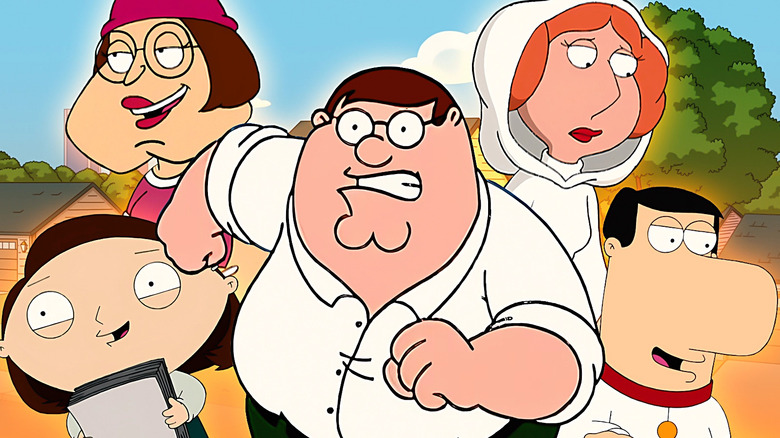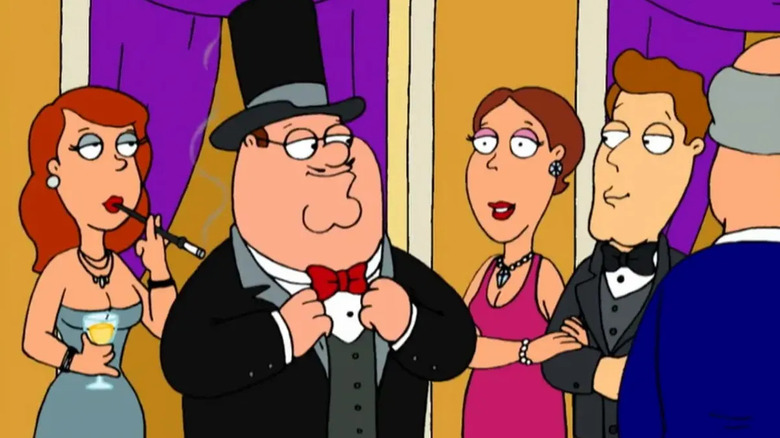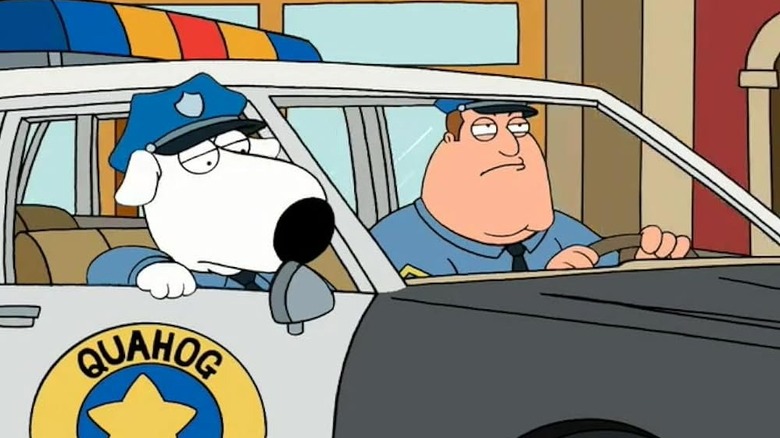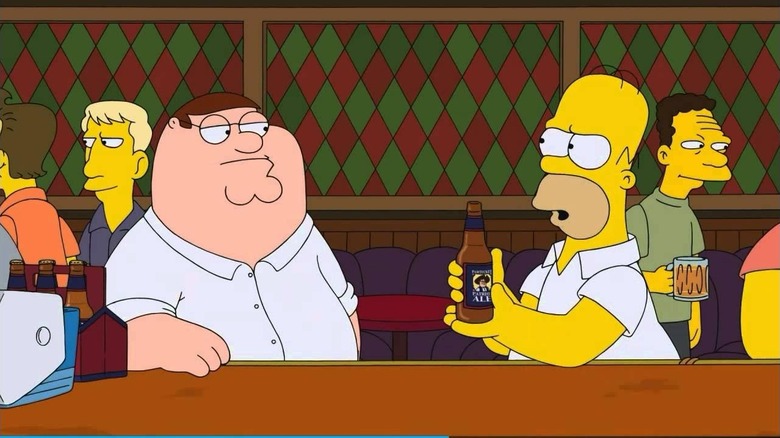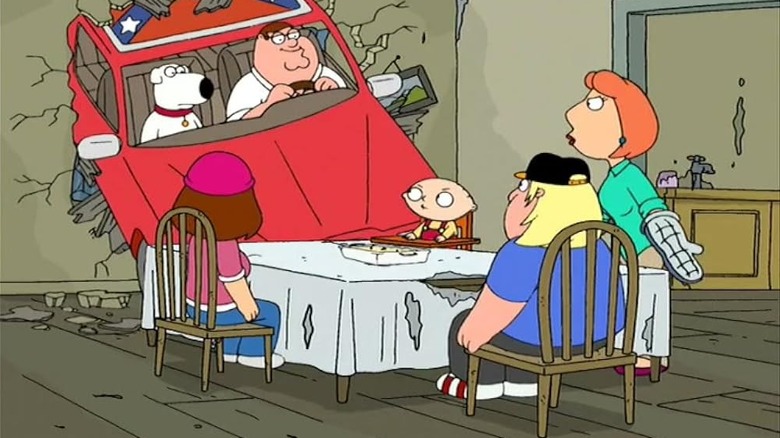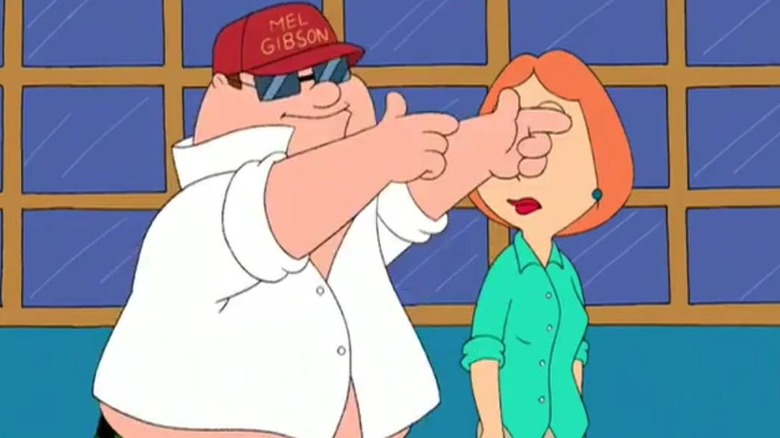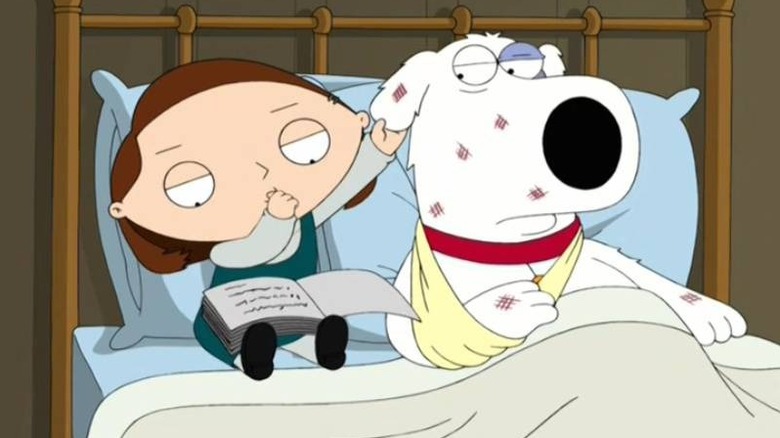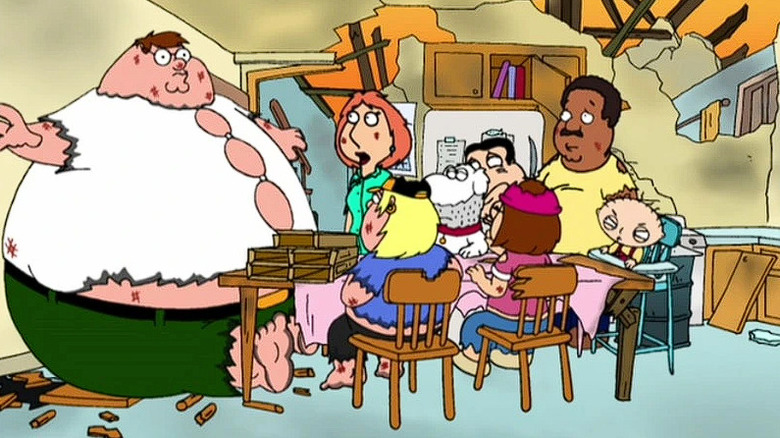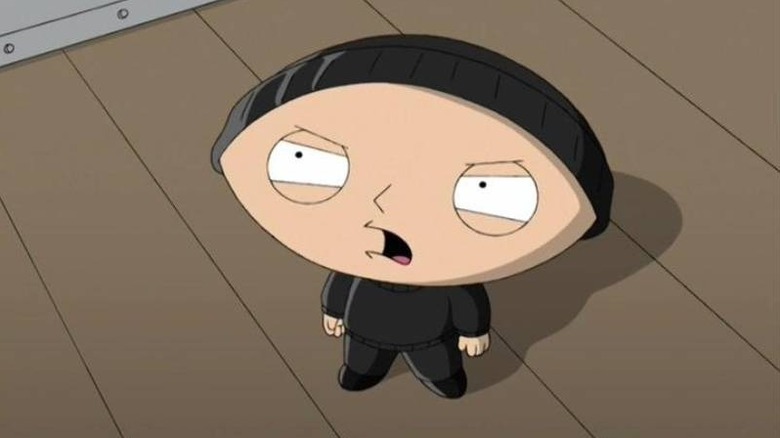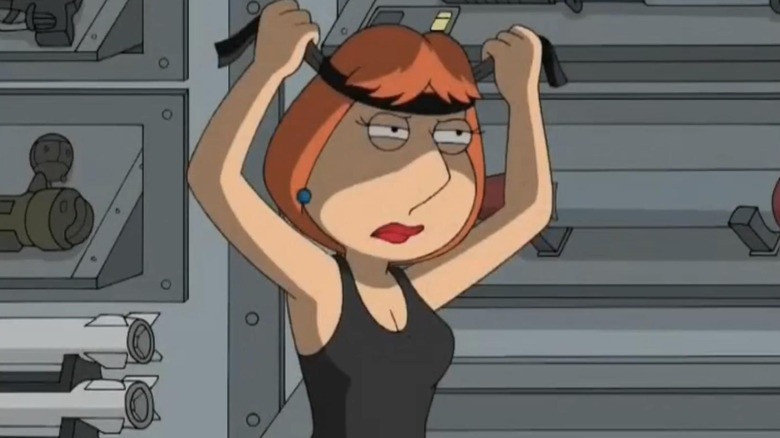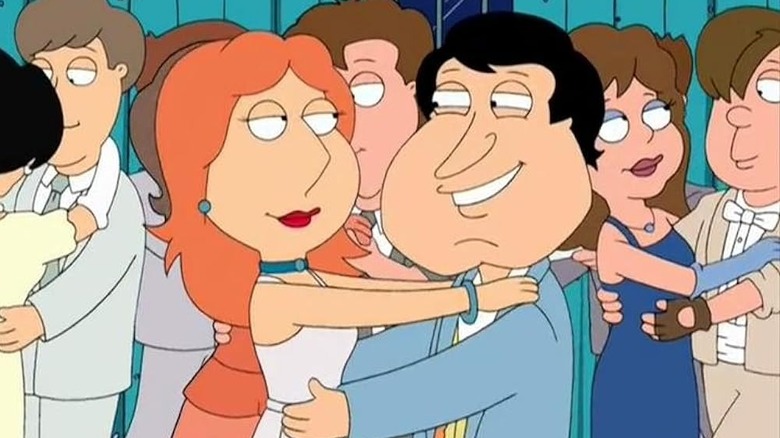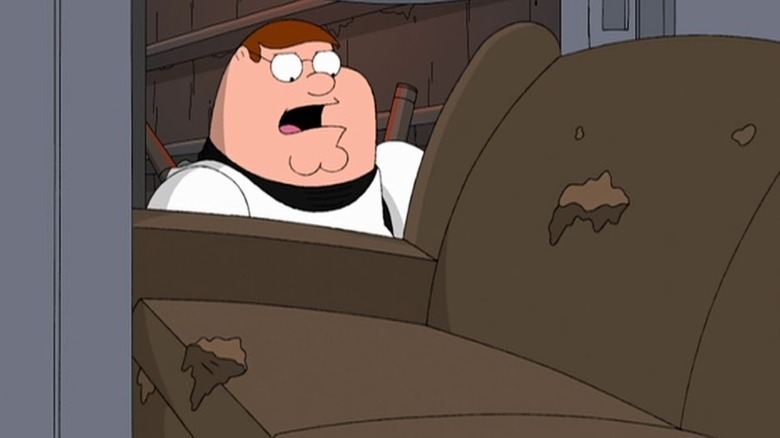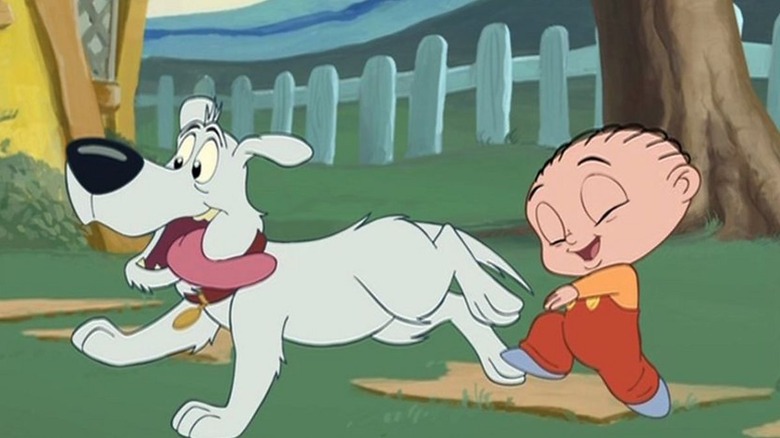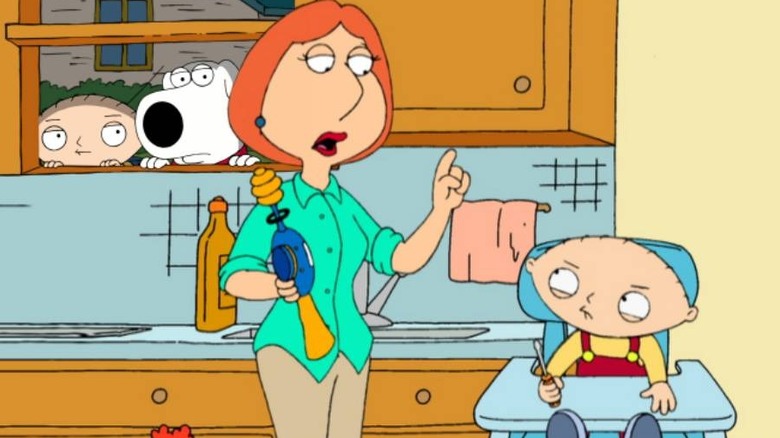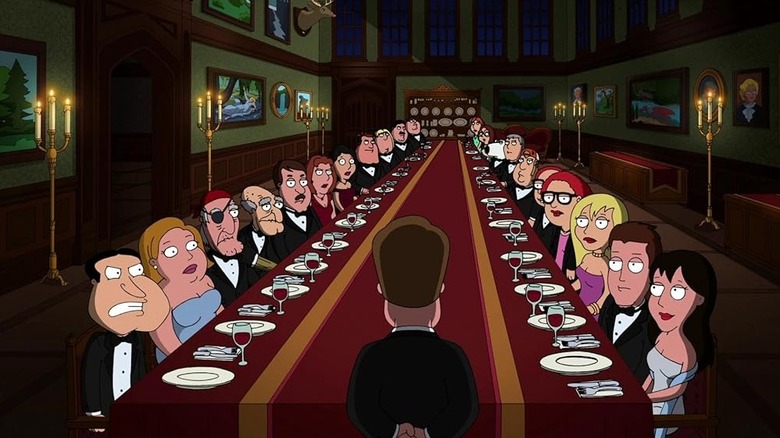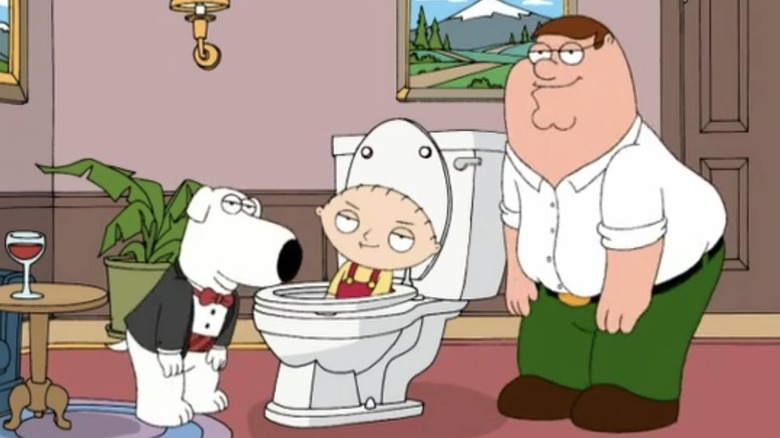The 15 Funniest Family Guy Episodes, Ranked
"Family Guy" has amassed countless comparisons to its Fox brethren "The Simpsons," but with over 20 seasons under its belt, it's safe to say the animated sitcom has forged its own path at this point. Sure, "Family Guy" has had its share of duds over the years, but it's also responsible for some truly great comedy. From giant chicken fights to Peter Griffin (Seth MacFarlane) declaring that "The Godfather" insists upon itself, we all remember where we were when we saw these jokes for the first time.
But what are the absolute funniest "Family Guy" episodes of all time? We're talking about the storylines that are pound for pound crammed with the best jokes in the series' history. It's one thing for a random cutaway to inspire a chuckle, but so many episodes are consistently entertaining throughout. These are the funniest "Family Guy" episodes with the greatest premises and best gags. And now, ladies and gentlemen, Mr. Conway Twitty...
Peter, Peter, Caviar Eater (Season 2, Episode 1)
The earlier seasons of "Family Guy" were definitely more prone to leaning into sitcom tropes. Inheriting a bunch of money from a random family member dying is as classic as it gets, and "Family Guy" goes to town on the concept in "Peter, Peter, Caviar Eater." Everyone gets a taste of luxury when they get Aunt Marguerite's summer home and try to fit in with high society.
The song "This House is Freakin' Sweet" is low-key one of the series' best. Peter comments how they have so many rooms that he can fart anywhere, and when Meg (Lacey Chabert, later Mila Kunis) asks if she's ugly, one of the servants responds, "It doesn't matter dear, you're rich now." Brian (Seth MacFarlane) teaching Peter how to be fancy by having him watch "Frasier" is as good of a parody of "My Fair Lady" as you can get. Transplanting these low-class characters into a high-class setting proves you don't always have to go off-the-wall with episode ideas. Sometimes, whatever's simplest is best.
The Thin White Line (Season 3, Episode 1)
Brian definitely got Flanders-ized later in the show's run, going from the voice of reason to annoying faux intellectual, but in the early seasons, he played a great straight man to Peter's antics. It helped make "The Thin White Line" in season 3 so much fun, when he becomes a drug-sniffing dog for the police force. Brian becomes addicted to drugs and lashes out in bizarrely hilarious ways. His wildly high laugh is enough to make you crack up completely on its own.
When Brian eventually goes to rehab for his addiction, Peter joins him, and a new setting is a new opportunity for hijinks. This was the very first episode of "Family Guy" I ever watched, and the part where Peter tries to come up with a fake name by looking at objects around the room (a pea, a tear, and a mythological Griffin) made me laugh for 10 minutes straight. It's so dumb and honestly helped the show break free of its "Simpsons" comparisons a bit. The show wasn't just edgier but far more random, and it's what got me hooked.
The Simpsons Guy (Season 13, Episode 1)
Despite accusations "Family Guy" ripped off "The Simpsons," there seems to be a mutual respect between the two creative teams behind the scenes. It undoubtedly led to the iconic crossover episode, "The Simpsons Guy," where the Griffin family winds up stranded in Springfield. Everyone pairs up, with Homer (Dan Castellaneta) and Peter becoming fast friends. Meanwhile, Stewie (Seth MacFarlane) gets enamored by Bart (Nancy Cartwright), and Lisa (Yeardley Smith) teaches Meg self-confidence.
The first half of the 44-minute runtime is non-stop gags comparing and contrasting the different sets of characters. The latter half goes full-blown meta, with Homer declaring that Peter's favorite beer, Pawtucket Ale, ripped off his beloved Duff. It's a not-so-subtle parallel of how people say "Family Guy" plagiarized "The Simpsons," leading to an epic fist-fight between Homer and Peter. Crossovers can be tricky to pull off, usually feeling more like a marketing opportunity rather than an organic set-up. However, it's hard to think of a better storyline to bring these two titans of animation together.
To Love and Die in Dixie (Season 3, Episode 12)
I love a good "fish out of water" plot, and in "To Love and Die in Dixie," the Griffins get sent to the South as part of a witness protection program after Chris (Seth Green) identifies a criminal. The episode plays with redneck stereotypes, like Peter using this new living situation to play out "Dukes of Hazzard." Chris gets plenty of time to shine here, too, as he starts the episode having trouble with girls, only to develop a romantic relationship with one, named Sam (Kathleen Wilhoite), when he thinks she's a boy at first.
The jokes are great, and what makes them even better is that they build to a truly emotional climax. Even though Peter made fun of rednecks, the locals save the day in the end. We never see Sam again, but her final exchange with Chris where he promises to write to her and she responds, "And I'll be sure to learn to read," is both funny and touching. With "Family Guy," you don't have to choose between pathos and bathos; you can have both.
North by North Quahog (Season 4, Episode 1)
As fans know all too well, "Family Guy" was cancelled twice early in its run. The first happened after season 2, but it was quickly renewed for a third season. It then went off the air after that, which creator Seth MacFarlane thought was a normal part of being in the entertainment business, and the Griffin family went dark for a few years. However, due to increased popularity from DVD sales and syndication on Adult Swim, convinced Fox to put it back into production. "Family Guy" had a lot to prove, and it came back strong with its season 4 opener, "North by North Quahog."
The episode opens with a hilarious bit of Peter telling his family they got cancelled and then listing all of the shows Fox kept instead of them for a full minute (all of them being shows that got cancelled). The rest of the story is a stellar "North by Northwest" parody that culminates in Peter and Lois (Alex Borstein) stumbling upon a sequel to "The Passion of the Christ," where Jesus teams up with Chris Tucker in an action-comedy. Honestly, that trailer alone makes this one of the funniest "Family Guy" episodes ever.
Three Kings (Season 7, Episode 15)
"Family Guy" adapted three Stephen King stories ("Stand By Me," "Misery," and "The Shawshank Redemption") in season 7's "Three Kings," and it remains the show's best anthology episode. The only real issue with this is that the "Misery" segment could've been a lot gorier had they adapted the book instead of the movie, but it's hard to complain watching Stewie go full psycho as Annie Wilkes.
It's nice to see "Family Guy" break away from its normal structure, and the show would continue cranking out anthologies in the seasons to come. But there remains something special about this one. Each story is told pretty faithfully, but with some extra "Family Guy" flair, like the main bully in "Stand By Me" having some "He-Man" villains as his back-up. The episode represents the ideal formula for transposing these movies into six-minute segments while still finding time for the kind of random jokes "Family Guy" has become known for.
Da Boom (Season 2, Episode 3)
A lot of animated shows had Y2K episodes at the turn of the millennium, but "Family Guy" may have done it best with season 2's "Da Boom." Peter's convinced the world will end at midnight, and no one believes him because he's, well, Peter Griffin. But he turns out to be right. The rest of the episode is a seemingly non-canon look at the post-apocalyptic wasteland the Griffins now need to navigate.
"Da Boom" should hold a special place in "Family Guy" fans' hearts because it contains the first ever giant chicken fight. It's relatively quaint in comparison to how ludicrous future fights would become, taking up sizable chunks of an episode's runtime, but it gets the job done. It's amazing how many great bits are in this one story, like Peter blowing up like a balloon after eating dehydrated food and then drinking water. It's such a simple visual gag that complemented greatly by Seth MacFarlane's line reading of "Everyone leave, I have to poop ... NOW!"
Stewie Kills Lois (Season 6, Episode 4)
"Family Guy" isn't afraid to kill off recurring characters, but in "Stewie Kills Lois," it seemed like the show finally dispatched with the Griffin matriarch. Killing Lois was Stewie's M.O. throughout much of the earlier seasons, something he's forgotten to do as of late, and perhaps he moved on from this mission because it didn't work out so well. Stewie kills Lois while she's on a cruise with Peter, causing the authorities to believe Peter's the one behind Lois' death.
Even if everything resets by the end, it's fun to see the characters in such different positions. Stewie is over-the-moon about finally proving he has what it takes to kill Lois. Peter uses his status as a widower to date everyone from Bonnie (Jennifer Tilly) to a stick figure. The episode centers on death, but it doesn't dampen the comedic impact of all these bits. Maybe that's due to us viewers knowing there's no possible way Lois is going to stay dead, as is revealed in the episode's finale.
Lois Kills Stewie (Season 6, Episode 5)
The follow-up episode, "Lois Kills Stewie," is just as good in quality to its predecessor. Lois reveals Stewie's the one that tried to kill her, forcing him to become a fugitive. Lois recounting her journey to getting back to Quahog is one misdirection after another, from getting rescued by a merman to becoming a camp counselor at a fat camp. Plus, this episode earns some bonus points for having some "American Dad!" cameos, establishing that the two shows do, in fact, exist in the same universe.
And then, there's the epic fight between Lois and Stewie. It almost feels like fan-fiction come to life, and it sort of is. The ending reveals everything we saw was just a simulation of Stewie seeing what would happen if he killed Lois, and since it doesn't go well, he doesn't pursue it. Stewie and Brian then debate whether that kind of cop-out is a middle finger to the audience in a genuinely great meta moment. There's also a fun jab at "The Sopranos" finale that's even better when you consider this episode came out the same year as that show ended, so it was still fresh in people's minds.
Meet the Quagmires (Season 5, Episode 18)
"Family Guy" has had many "Back to the Future" references, so it's only appropriate that they dedicate an entire episode to that film's plot. Peter travels back in time and makes it so that he doesn't marry Lois, in order to enjoy his youth more, only to realize in the present that she gets with Quagmire (Seth MacFarlane) after he blew her off all those years ago.
The '80s jokes are great, from Peter telling Brian that they could write "Die Hard" to Brian singing Rick Astley's "Never Gonna Give You Up" once Peter and Lois reconcile. It's also fun to see all of the many positive ways the future is better in the timeline where Peter doesn't marry Lois, like Al Gore being President of the United States instead of George W. Bush. The design choice to make Stewie, Chris, and Meg look exactly like themselves in the alternate future, only with giant chins like Quagmire, is also superb. There's no low point to this episode, as the writers found all the best ways to make the past and future jokes land.
Blue Harvest (Season 6, Episode 1)
The only movie "Family Guy" has probably done more jokes about than "Back to the Future" is "Star Wars," and in 2007, "Family Guy" recreated all of "Star Wars: Episode IV — A New Hope" with "Blue Harvest," named after the working title of "Return of the Jedi." During a blackout, Peter tells his family about the glorious story of "Star Wars," and audiences get treated to a beat-for-beat parody where Chris is Luke Skywalker, Lois is Princess Leia, and Peter is Han Solo.
There are definitely jokes only hardcore "Star Wars" fans may appreciate, like the Mos Eisley Cantina band playing the same song over and over again. But it's not all insider jokes, like when Han and Chewbacca (portrayed by Brian, obviously) try to salvage an old couch from the trash compactor. It's a perfect encapsulation of how to do a parody right. The episode makes fun of "Star Wars," but you can feel the reverence with every joke. None of the jabs feel mean-spirited, as this is simply a very nerdy production crew paying homage to one of the most influential films of all time. Many "Star Wars" parodies exist, but this is at the top of the pack.
Road to the Multiverse (Season 8, Episode 1)
The "Road To..." episodes of "Family Guy" are a treat, as they see Stewie and Brian going on some adventure with a musical sequence thrown in. Easily, the best of the "Road To..." series is season 8's "Road to the Multiverse." Before "Rick and Morty" took the concept and ran with it, "Family Guy" had a reality-hopping adventure where Stewie and Brian travel through all sorts of bizarre worlds. This includes dimensions where scientific knowledge has advanced by centuries, the Griffins are now the Flintstones, and everything is animated like a Disney movie.
It's the kind of episode you can only do eight seasons into a show's run. We know these characters inside and out, and this episode allows the writers to re-contextualize them whichever way they like. "Family Guy" was ahead of the curve in some ways, utilizing the multiverse before multiple franchises relied on it, but it remains an ideal blueprint on how much fun can be had with it when you're not busy cramming in cameos.
Back to the Pilot (Season 10, Episode 5)
Honestly, season 10's "Back to the Pilot" could've functioned as a great series finale if "Family Guy" was going to get cancelled ... again. Stewie and Brian travel back in time to the events of the show's pilot episode, leading to jokes that are sure to tickle all long-time fans. The pair comment on the wonkier animation style as well as Meg's voice actor being Lacey Chabert rather than Mila Kunis. It's packed to the brim with referential humor, but amazingly, it never feels self-serving. It's like a love letter to itself.
But as is so often the case with time travel plots, the past gets altered, so there's a worse future in store. This eventually leads to dozens of Stewie and Brian pairs making their way to the past to fix everything. The episode's a solid showcase for how to effectively heighten a joke while still leaving wiggle room to return to the status quo by the end. "Family Guy" has used time travel and the multiverse to make fun of other shows, but "Back to the Pilot" allows the show to look inward.
And Then There Were Fewer (Season 9, Episode 1)
It's easy to see why "And Then There Were Fewer" is Seth MacFarlane's favorite "Family Guy" episode. It's a fun murder mystery episode where many Quahog residents have been invited to a mysterious mansion where people start dying. It's an incredibly ambitious episode because several long-running characters die for real here and don't come back. It's a perfect demonstration of how the show doesn't need to depend on the multiverse for offering twists and turns when there are far more grounded ways to upend expectations.
"Family Guy" has some great supporting characters outside of the Griffin family, and this episode gives a bunch of them time to shine, especially when they investigate the manor to see who's killing people. I never would've expected to see Carl (H. Jon Benjamin) and news anchor Tom Tucker (MacFarlane) interact, but I'm glad they got to chat about "Labyrinth" here.
PTV (Season 4, Episode 14)
"Family Guy" season 4 really feels like the show needing to prove something, resulting in the funniest episode throughout its run: "PTV." Peter, upset that the Federal Communications Commission has censored his favorite shows, starts his own TV station, running afoul of censors himself. There's clearly some meta commentary about "Family Guy" getting in trouble with the FCC due to its raunchy humor and poking fun at how sensitive folks can be. "PTV" feels like a mission statement of sorts about how TV shows should be allowed to push boundaries.
"The FCC Song" is pure bliss, with Peter, Brian, and Stewie joining forces to berate the FCC as well as provide some clips from the show's most outrageous moments. "PTV" is more than just a TV series wanting to be offensive; it demonstrate how "Family Guy" came back from the dead and will do everything in its power to prove that it belongs to run just as long as "The Simpsons" and "South Park." Given how "Family Guy" has stayed on the air ever since its fourth season, it's safe to declare "Family Guy" the victor in its battle against the FCC.
